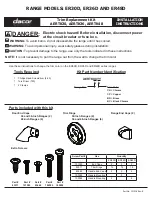
2 3
Cooking Results Not Satisfactory?
Problem
Check
Grilling
Uneven cooking front to
back
Ensure that the grill pan is positioned centrally below
the grill element.
Fat splattering
Ensure that the grill is not set to too high a
temperature.
Oven Baking
Uneven rising of cake
Ensure that the oven shelves are level by using a
spirit level on the rod shelf and adjusting, using
suitable packing e.g. wood, under the feet of the
appliance. This should be checked both left to right
and front to back. Ensure that the food is positioned
centrally in the oven.
Sinking of cakes
The following may cause cakes to sink:
1. Cooking at too high a temperature.
2. Using normal creaming method with soft margarine.
Over/Under cooking
Fast/Slow cooking
Refer to the cooking times and temperatures given in
the oven temperature charts, however, it may be
necessary to increase or decrease temperatures by
10°C to suit personal taste.
Do not use utensils greater than 2¼ ins in height.
Uneven cooking of
cakes
1. Too large baking sheet used. (See 'Cookery Notes')
2. Over loading of oven and always ensure even air
gaps around baking tins.
Uneven rising of cake
Ensure that the shelf is level (see above) and that the
food is positioned centrally in the oven.
Food is taking too long
to cook
Only cook one item at a time to avoid overloading the
oven.
Disposal of your product
To minimise the risk of injury to children please dispose of your product carefully and safely. Remove all
doors and lids. Remove the mains cable (where fitted) by cutting off flush with the appliance and always
ensure that no plug is left in a condition where it could be connected to the electricity supply.
To help the environment, Local Authority instructions should be followed for the disposal of your product.
This appliance conforms to the following EEC Directives:
-
2006/95/
EC
of 12/12/06 (Low Voltage) and subsequent modifications;
-
2004/108/
EC
of 15/12/04 (Electromagnetic Compatibility) and subsequent modifications;
-
90/396/
EEC
of 29/06/90 (Gas) and subsequent modifications (only for models which use gas);
-
93/68/
EEC
of 22/07/93 and subsequent modifications.
-
2002/96/
EC
93/68/EEC
The European Directive 2002/96/EC on Waste Electrical and Electronic Equipment (WEEE), requires that old
household electrical appliances must not be disposed of in the normal unsorted municipal waste stream. Old
appliances must be collected separately in order to optimise the recovery and recycling of the materials they
contain and reduce the impact on human health and the environment. The crossed out “wheeled bin” symbol on
the product reminds you of your obligation, that when you dispose of the appliance it must be separately
collected.
Consumers should contact their local authority or retailer for information concerning the correct disposal of
their old appliance.






































